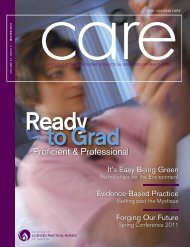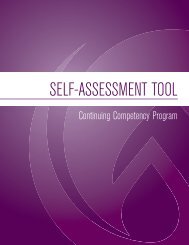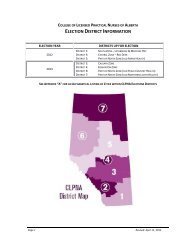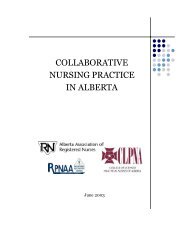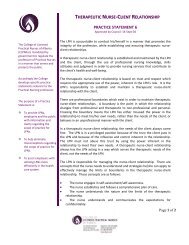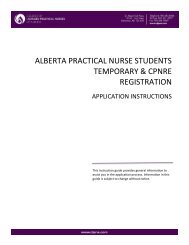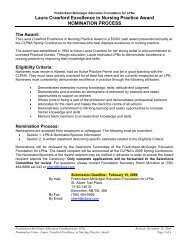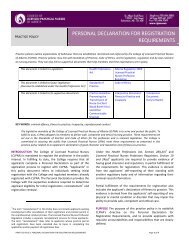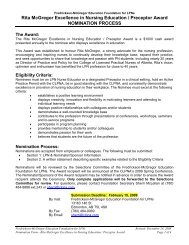Download PDF - College of Licensed Practical Nurses of Alberta
Download PDF - College of Licensed Practical Nurses of Alberta
Download PDF - College of Licensed Practical Nurses of Alberta
- No tags were found...
Create successful ePaper yourself
Turn your PDF publications into a flip-book with our unique Google optimized e-Paper software.
esearchUnderstanding Healthcare Provider Barriers to Prescribingand Recommending Non-pharmacological SleepInterventions for Persons Diagnosed with DementiaBy CA Brown (PI) 1 , P Wielandt 1 , D M Wilson 2 , A Jones 3 , M Bullock 1 , K Crick 3(1Department <strong>of</strong> Occupational Therapy, 2 Faculty <strong>of</strong> Nursing, 3 Department <strong>of</strong> Physical Therapy, University <strong>of</strong> <strong>Alberta</strong>, Edmonton, Canada)This project was completed by theSleep and Function InterdisciplinaryGroup (SAFIG) <strong>of</strong> the Faculty <strong>of</strong>Rehabilitation Medicine, University <strong>of</strong><strong>Alberta</strong>. This research group was ledby Dr Cary Brown, Associate Pr<strong>of</strong>essor,Department <strong>of</strong> Occupational Therapy,Faculty <strong>of</strong> Rehabilitation Medicine,University <strong>of</strong> <strong>Alberta</strong> (cary.brown@ualberta.ca). The project was fundedthrough the Addiction & Mental HealthResearch Partnership Program: <strong>Alberta</strong>Health Services (AHS) (http://www.albertahealthservices.ca/2770.asp).Executive SummaryFor persons with dementia (PWD),sleeping problems are <strong>of</strong>tenunrecognized and undertreated. This isa concern for two reasons: disorderedsleep may contribute to the onset <strong>of</strong>their dementia and a lack <strong>of</strong> restorativesleep can negatively impact the healthand functioning <strong>of</strong> both the personliving with dementia and their familycaregivers. Early identification andappropriate intervention for sleepproblems can help reduce the risk<strong>of</strong> dementia onset and/or slow theacceleration <strong>of</strong> the illness.Presently, the relationship between sleepand dementia is not well understood bymost healthcare providers and familycaregivers <strong>of</strong> PWD. Traditionally,sleep problems have been treatedwith medication, but this can cause arange <strong>of</strong> side effects. Although thereare evidence-based interventionsfor sleep disorders that are nonpharmacologicalthese interventionsare not routinely recommended knownto healthcare workers because <strong>of</strong>a prevalent research-to-action gap.Consequently healthcare providerslack the knowledge required to makerecommendations to family membersabout pragmatic sleep interventionsfor PWD. Addressing this gap throughevidence-based knowledge translationand exchange (KTE) strategies willultimately contribute to improvedhealth and quality <strong>of</strong> life for bothPWD and their family caregivers. Inturn, optimal health and functioningare positive influences supporting thepriority goal <strong>of</strong> PWD and their familycaregivers remaining able to live safelyand with quality in their own homes.The first step in addressing thisknowledge-to-action gap is todetermine the current state <strong>of</strong> sleepassessment and intervention practice<strong>of</strong> healthcare providers workingwith PWD. Knowing this helps laya strengths-based foundation formore targeted KTE and educationalstrategies addressing sleep problemsfor PWD. This study, Understandinghealthcare provider barriers toprescribing and recommending nonpharmacologicalsleep interventionsfor persons diagnosed with dementiagathered quantitative and qualitativesurvey data from 2,027 healthcareproviders from across Canada. Therespondents to the survey representeda wide range <strong>of</strong> pr<strong>of</strong>essional groups>care | spring 2013 23



